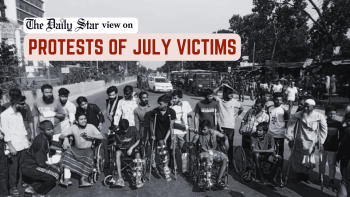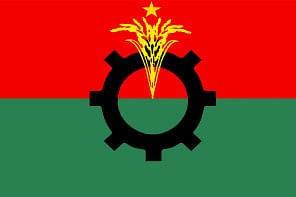Workers deserve a better deal in new Bangladesh

It is no secret that the July mass uprising was made possible by the sacrifices of many individuals, particularly workers and underprivileged communities. Without them putting their bodies in the line of fire, alongside students, this uprising would not have succeeded in bringing down the autocratic Awami League regime. It is, thus, unfortunate to see that their contributions are still not receiving the recognition they deserve. Instead, as speakers pointed out during a discussion organised by The Daily Star on the sidelines of a photo exhibition titled "36 Days of July," these individuals risk being "erased" from the narrative.
The lack of recognition is evident not only in the failure to properly document their contributions but also in the continued disregard for their needs and rights—as evidenced by the plight of the injured seeking treatment and rehabilitation, as well as workers in various sectors. Part of the challenge is that a comprehensive list of those injured or killed has yet to be finalised, even after four months. This is affecting the fund disbursement efforts of the July Shaheed Smriti Foundation, which earlier promised to deliver all the funds by December. While the compensation amount itself has been criticised as inadequate, its prompt disbursement could address some, if not all, of the issues facing the injured. The continued delays and hurdles reported in accessing treatment and medication also need to be resolved.
The most meaningful tribute to these unsung heroes of the uprising would be to build a pro-worker business ecosystem where their rights and dignity are guaranteed. We have an obligation to ensure that these individuals are not only remembered for their sacrifices but also given their due through tangible improvements in their lives.
The fact is, these people, including rickshaw-pullers, garment workers and other marginalised individuals, paid a heavy price for their involvement in the July uprising. Many families lost their primary breadwinners. Many survivors suffered life-altering injuries. Beyond treatment or compensation, what they need is proper rehabilitation to rebuild their lives, in which the government must help. An accurate victim list is also essential to prevent a repeat of the flawed listing of 1971 freedom fighters, which remains a cautionary tale of exploitation.
That said, the most meaningful tribute to these unsung heroes of the uprising would be to build a pro-worker business ecosystem where their rights and dignity are guaranteed. We have an obligation to ensure that these individuals are not only remembered for their sacrifices but also given their due through tangible improvements in their lives. In the past, workers' demands for fair wages, safe workplaces, and reasonable working hours were frequently dismissed in favour of appeasing powerful industrial groups. Workers have long been treated as disposable—whether it's the appalling treatment of migrant workers, or the exploitation of RMG workers, or the invisibility of sanitation workers. The change promised by the head of the Labour Reform Commission recently makes us hopeful. But it must be backed by structural reforms in labour laws and practices.
Bangladesh finally has an opportunity to address decades of inequities and ensure the dignity and rights of all. The sacrifices of our workers demand nothing less. Let us not fail them.


 For all latest news, follow The Daily Star's Google News channel.
For all latest news, follow The Daily Star's Google News channel. 










Comments